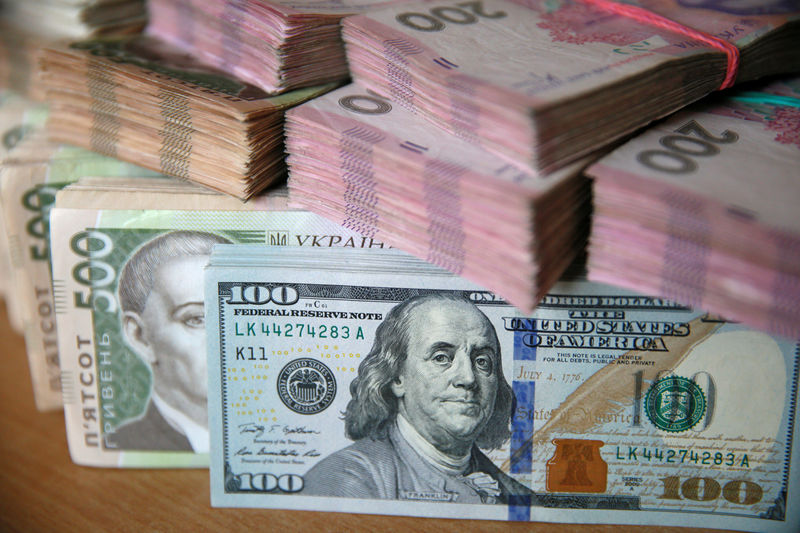By Alessandra Prentice
KIEV (Reuters) - An anti-corruption reform requiring senior Ukrainian officials to declare their wealth online has exposed a vast difference between the fortunes of politicians and those they represent.
Some declared millions of dollars in cash. Others said they owned fleets of luxury cars, expensive Swiss watches, diamond jewellery and large tracts of land - revelations that could further hit public confidence in the authorities in Ukraine, where the average salary is just over $200 (£163) per month.
Officials had until Sunday to upload details of their assets and income in 2015 to a publicly searchable database, part of an International Monetary Fund-backed drive to boost transparency and modernise Ukraine's recession-hit economy.
Prime Minister Volodymyr Groysman, who last week likened the declarations process to jumping out of an airplane, revealed that he and his wife had a total of $1.2 million and 460,000 euros (£412,285) in cash and a collection of luxury watches.
The database also shows that Groysman, a former businessman and provincial mayor, is not alone in preferring to keep much of his money out of Ukraine's banking system.
Reuters calculations based on the declarations show that the 24 members of the Ukrainian cabinet together have nearly $7 million, just in cash.
The declarations of two brothers in President Petro Poroshenko's faction, Bohdan and Yaroslav Dubnevych, show holdings of over $26 million, also in cash only.
"When the Economy Ministry says that in some areas around 60 percent of the economy is in the shadows, then this is accounted for by the volume of cash registered by civil servants, officials and lawmakers," said Taras Kachka, deputy executive director at George Soros's International Renaissance Foundation.
"This is a reflection on the state of our society."
Justice Minister Pavlo Petrenko, who declared $1 million in a bank account and a further $500,000 in cash, said officials' decision to hold cash pointed to a mistrust in the banks that many Ukrainians could relate to.
"Of course to EU countries it seems uncivilised that people hold cash," he said. "But it is linked to the fact that the banking system could, let's say, be doing better. This is a problem for many Ukrainians who lost their savings in the bank."
A $10,000 BOTTLE OF WINE
The online declaration system is intended to represent a show of good faith that officials are willing to open their finances up to public scrutiny, to be held accountable, and to move away from a culture that tacitly allowed bureaucrats to amass wealth through cronyism and graft.
However, the public reaction has been one of shocked dismay at the extravagant lifestyles conjured up by many of the disclosures.
"We did not expect that this would be such a widespread phenomenon among state officials. I can't imagine there is a European politician who invests money in a wine collection where one bottle costs over $10,000," said Vitaliy Shabunin, the head of the non-governmental Anti-Corruption Action Center.
Opposition bloc lawmaker Mikhail Dobkin's declaration included 1,780 bottles of wine and an antique copy of Russian novel Anna Karenina worth at least $5,500.
Roman Nasirov, the head of the State Fiscal Service, disclosed that he and his wife owned Swiss watches, diamond jewellery, fur coats, fine porcelain and crystal glassware, an assault rifle and cash in euros and dollars worth $2.2 million.
The declaration of Oleh Lyashko, the head of the populist Radical party who has styled himself as a representative of the common man, showed he rented a house and land in Kiev's most exclusive district and his household had cash worth the equivalent of over $1 million.
Other forms give an insight into particular hobbies and interests of Ukraine's elite.
Ihor Hryniv, the head of Poroshenko's faction, has a collection of icons dating from the 14th century and several works by Ukrainian impressionist masters. Lawmaker Ihor Mosiychuk declared an array of antique weapons, including a 16th century Turkish scimitar, an English broadsword and a Nazi SS dagger.
Many senior politicians filed their forms in the last two days before the deadline, resulting in a crescendo of surprise and anger on social media over the weekend.
"I personally feel unwell. Or rather, like someone who has been beaten and is therefore unwell. I had no illusions about our political and official elite. But all the same, what's come out is beyond the pale," Roman Donik, a volunteer to Ukraine's frontline troops, said on Facebook (NASDAQ:FB).
The average Ukrainian citizen has been hit hard by the economic crisis that unfolded in the wake of the 2014 pro-European 'Maidan' uprising and subsequent pro-Russian separatist conflict.
The national hryvnia currency has plummeted to 25 to the dollar from 8 in 2013 and energy tariffs have soared under the IMF-backed economic reform programme.
The latest revelations will likely add to public dissatisfaction with the current leadership's progress on reforms. A September poll showed that only 12.6 percent would now vote for Poroshenko's faction, down from 21.8 in the last election. Meanwhile support for populist and opposition parties has risen.
The anti-corruption agency says it will now start verifying the declarations, but with over 100,000 forms submitted, it is unclear how thorough the process can be.

(This version of the story corrects spelling of PM's first name in paragraph 4)